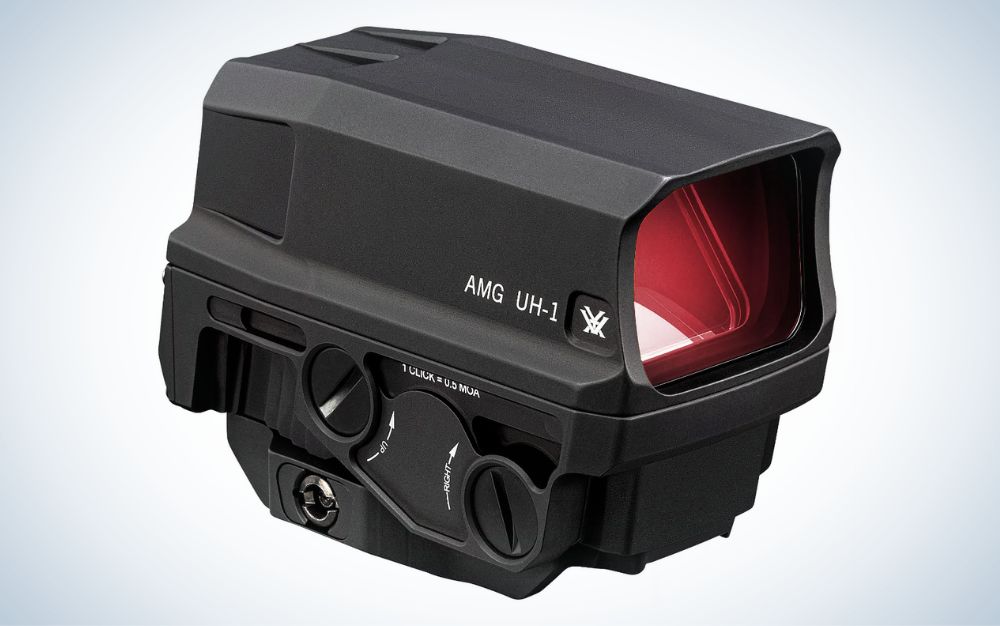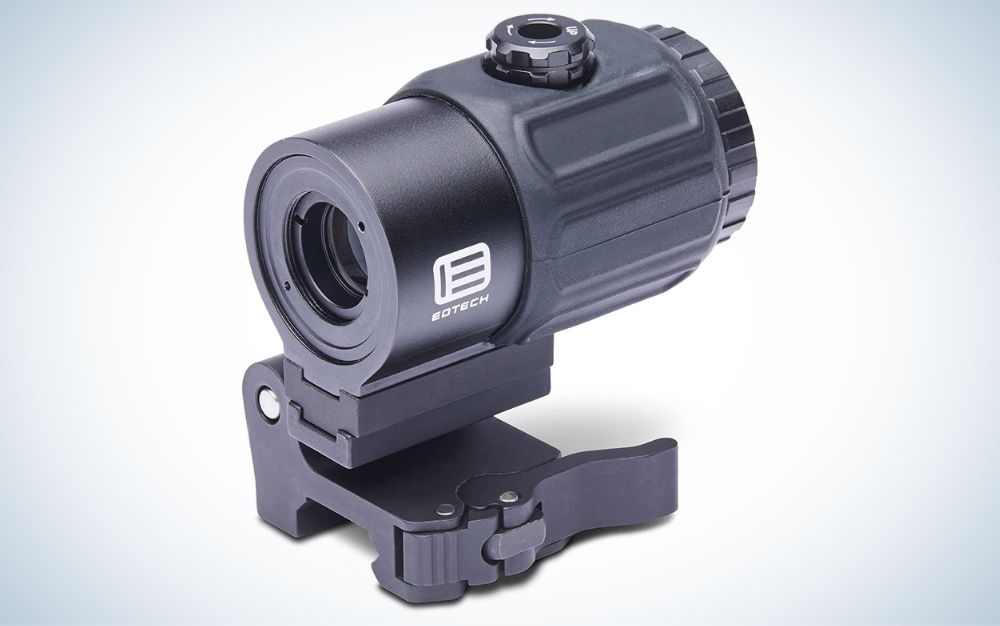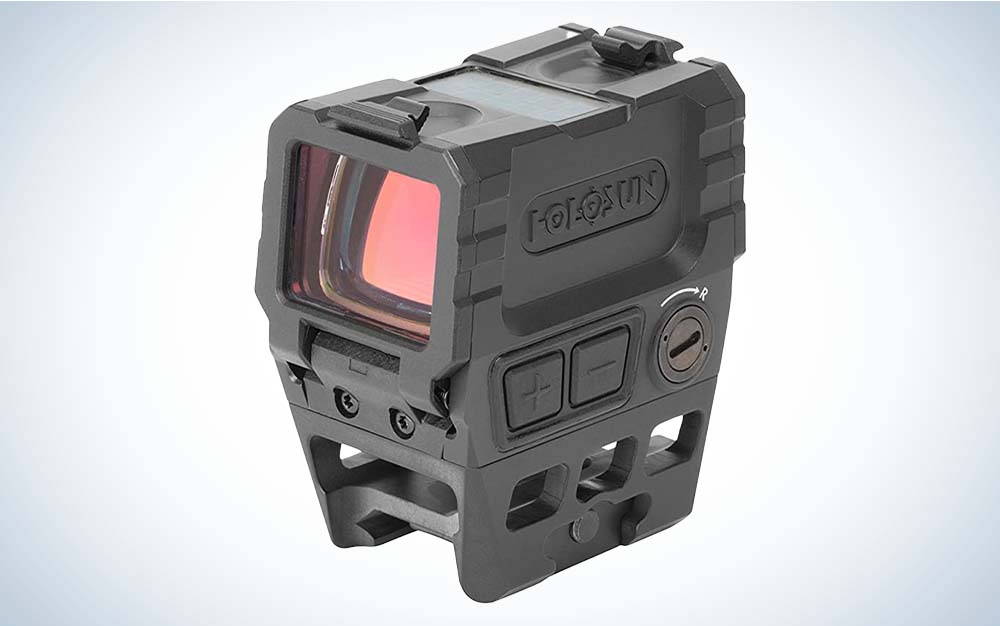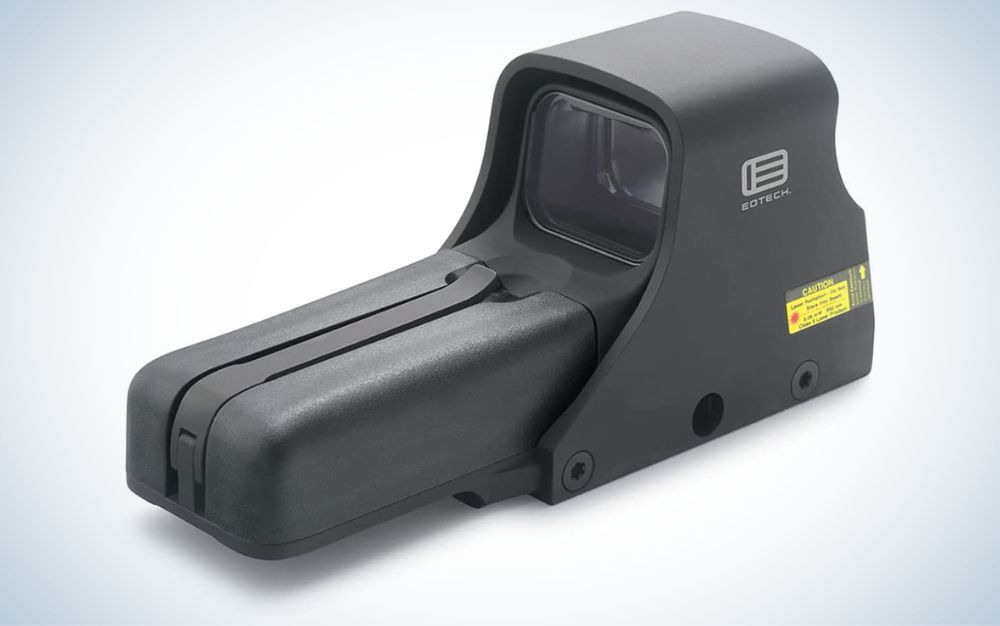We may earn revenue from the products available on this page and participate in affiliate programs. Learn More ›
Updated Feb 9, 2023 10:10 AM
Finding a holographic sight that best suits your needs depends on your intent with your rifle or carbine. As a firearms instructor for Fieldcraft Survival, I travel the country and see shooters from all walks of life training with holographic sights. Many of my students just hit the range to shoot and learn new techniques, but the majority of Fieldcraft’s clientele either carry a gun to work or for self-defense. With this goal in mind, users should discern whether their equipment is reliable and durable enough to perform when they need it.
Holographic sights are a dramatic improvement over traditional iron sights, and they allow you to incorporate other capabilities like magnification or night vision. Selecting the correct sight from the get-go will not only save you headaches in training, but it can save you money in the long run. Take the time to think through what you need your carbine to accomplish and select a holographic sight that supports that mission. Below is a list of the best holographic sights I’ve used during my career in law enforcement and as a shooting instructor, and I wouldn’t hesitate to depend on any of them during patrol or a day at the range.
Why It Made the Cut
The extremely durable EOTECH EXPS3 pairs well with both night vision and magnifiers, thanks to its intuitive side-mounted controls. With a large field-of-view, aluminum protective hood, and 7mm raised, quick detach base, the EXPS3 offers a great heads-up display for two-eyes-open shooting.
Key Features
- Night vision compatible
- Water resistant
- 30 brightness settings
- 1,000-hour battery life
- Operates in temps from -40 to 140 degrees
- Parallax free
Pros
- Extremely rugged
- Three reticle options
- Standard and night vision modes
- Quick-detach lever
Cons
- Expensive
- Lacks the battery life of other competitors
Product Description
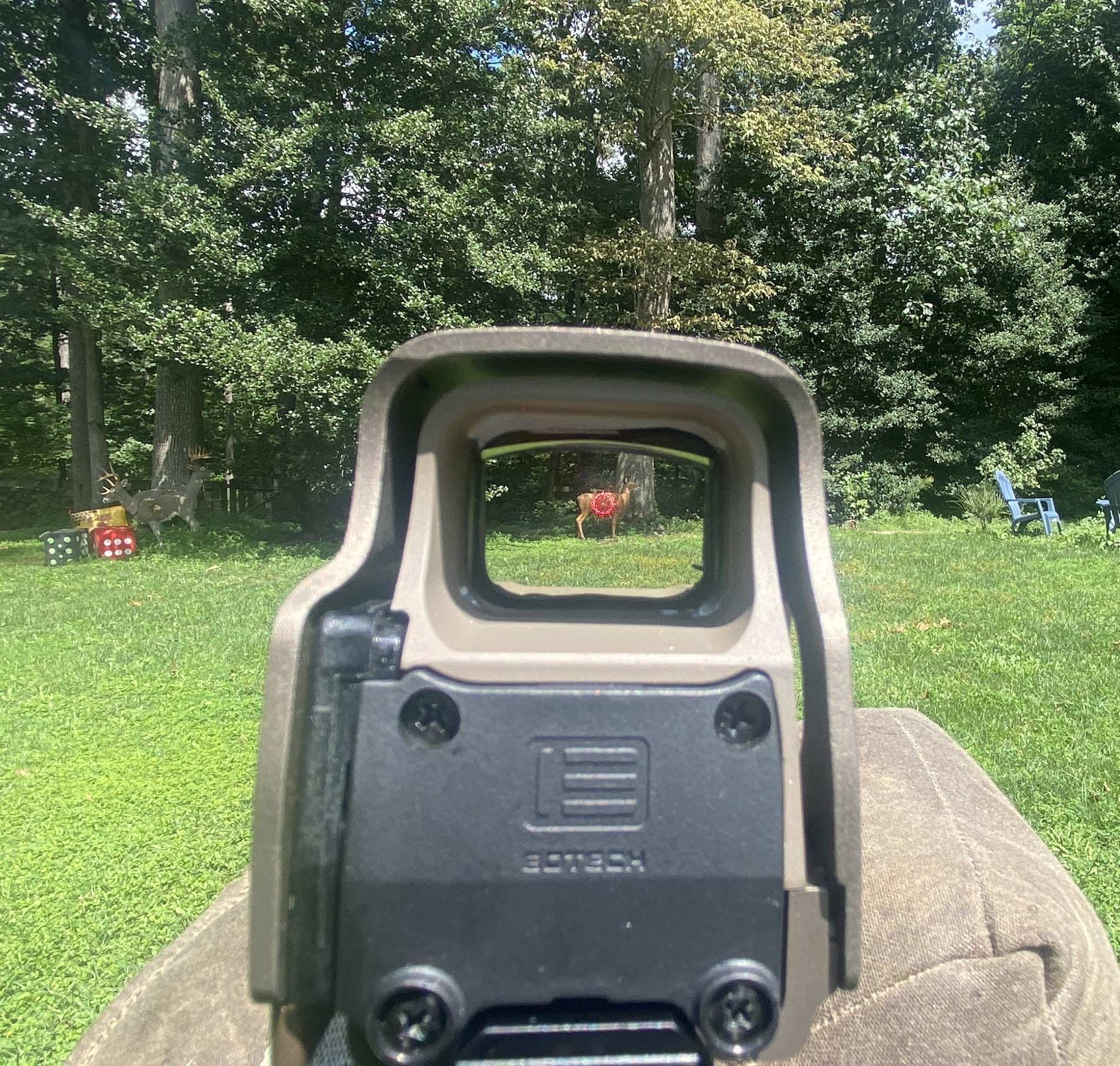
I’ve been using the EOTECH EXPS3 as my primary duty optic since 2018. Whether bouncing around the front seat of my vehicle on fugitive apprehensions or on SWAT callouts during Colorado blizzards, both EXPS3 sights I’ve used perform almost flawlessly.
Featuring an aluminum hood to protect the sight from impact damage, the EXPS3 attaches to your Picatinny rail via a crossbolt and quick-detach lever. The large window and full field of view reduces tunnel vision and allows two-eyes-open vision while shooting, with no protruding knobs or compartments to clutter your view.

This holographic sight offers three reticle options; the 1-Dot, 2-Dot and 4-Dot reticles. I prefer the 1-Dot and use the center 1 MOA dot for my 50/200 meter zero. One of my favorite features of the 1-Dot is the 68 MOA ring with lower hash mark, which you can use as your point of aim at seven yards. When I enter a structure, I instantly make the mental shift to use the bottom hash, which negates having to consider my height-over-bore offset when time is of the essence. While even the best holographic sights will exhibit some parallax, the EXPS3 comes as close as you can get to parallax free. And within short range distances, it’s non-existent.
Why It Made the Cut
The second gen UH-1 remedies design flaws from the original, primarily replacing the internal battery with a CR123A and tool-less battery cap. Vortex also added night vision modes to the UH-1 Gen II and kept the huge field-of-view and clear glass from its predecessor.
Key Features
- Unlimited eye relief
- 1 MOA Dot
- Multiple anti-reflective coatings
- 15 brightness settings
- Parallax free
Pros
- Large field-of-view
- EBR-CQB reticle
- Dedicated night vision button
- Clear glass
Cons
- Night vision settings are slightly dim compared to competitors
Product Description
I’ve used the UH-1 Gen II on students’ guns at courses, and I have one on my 11.5-inch BCM carbine. While zeroing at 50 yards, I immediately noticed the enormous window and clear glass. Attached via an integrated quick release mount, the UH-1 includes a tool-less battery cap for its CR123A battery which runs the sight for 1,500 hours, slightly outperforming the EXPS3.
The reticle on the UH-1 is extremely bright and reminded me of other premium Vortex offerings like the Razor HD but with the added benefit of having the EBR-CQB holographic reticle. The EBR-CQB features a 1 MOA dot, with a 65 MOA outer circle for fast target acquisition. At the bottom of the outer circle there’s a CQB triangle, which gives you point of aim, point of impact at 10 yards, like the EOTECH EXPS3. With competition in mind, I started working target transitions and shooting while moving, and the UH-1 performed admirably at both.
I spent subsequent range days with the UH-1 under night vision. Passive aiming through the sight was easy thanks to the large field-of-view, but the settings were noticeably dimmer than its competitors. At times, the reticle appeared to wash out with ambient light present, which made accurate shots difficult. I have no reservations running the UH-1 at a two-gun match but prefer other options for a defensive carbine under night vision.
Why It Made the Cut
Eotech’s venerable G33 magnifier has been miniaturized into the G43, reducing the overall length buy more than an inch. Without sacrificing magnification (3x), the G43 frees up rail space for backup iron sights or a secondary red dot sighting system.
Key Features
- Fixed 3x magnification
- Weight: 11.3 ounces
- Eye Relief: 2.5 inches
- Fog resistant internal optics
- Ambidextrous (adjustable for left and right-handed shooters)
Pros
- Fast transition from 1 to 3x
- Quick-detach lever
- Tool-less adjustments
- Adjustable diopter
Cons
- Carbon dirties the front lens of the magnifier when ran on the right side
Product Description
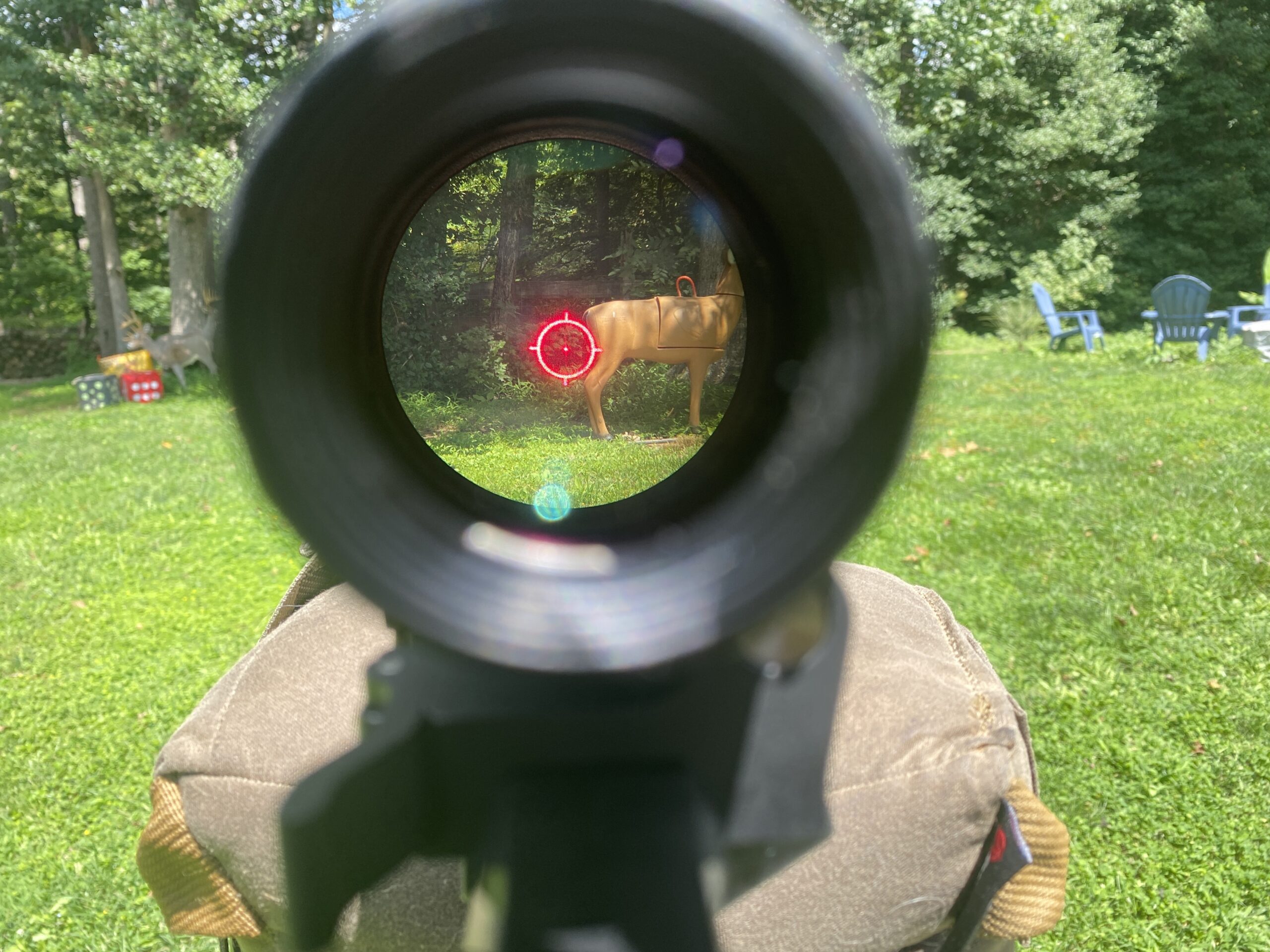
I ran the G33 magnifier behind my EXPS3 since I bought both in 2018 but since replaced it with the G43, which offers all the same great features with a reduced footprint. The 3x magnification makes 500-meter shots realistic for ARs, and the instant transition from 3x to 1x makes it the perfect accessory for a defensive carbine. This magnifier attaches via a quick-detach lever and has vertical and horizontal adjustments to center your sight’s reticle inside the magnifier. Once you center the reticle, it’s best to re-zero the holographic sight now that you have a more defined sight picture and point of aim. This prevents a perceived zero-shift when you transition between magnification settings. It also makes zeroing easier than when you shoot with your bare eye.

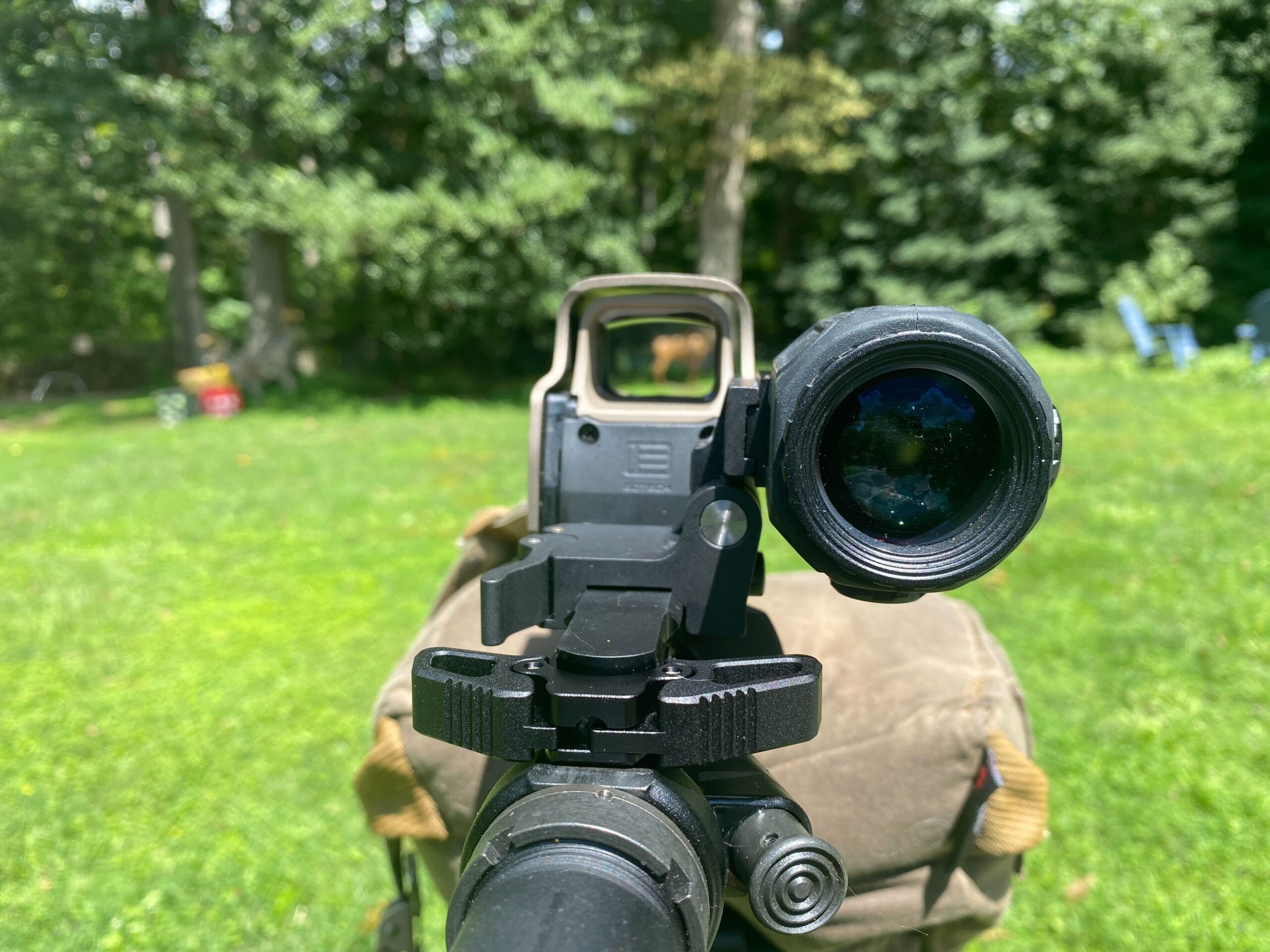
You can also attach the G43 to shift either right or left based on preference. I run my magnifiers to shift right so they don’t obscure my left eye while shooting but understand that this method places the magnifier behind the ejection port where carbon will coat the lens during high round count training sessions.
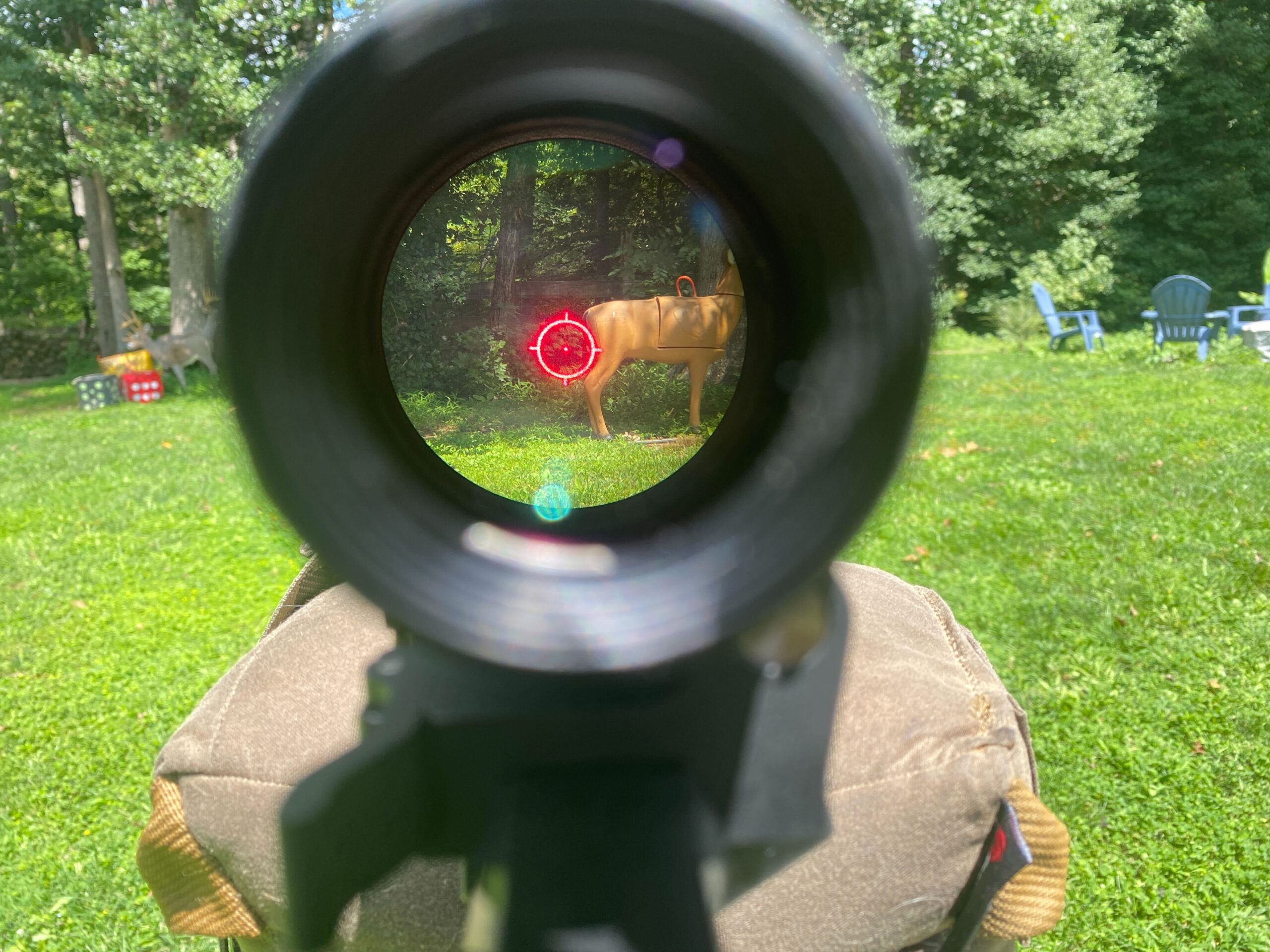
Why It Made the Cut
The solar failsafe and shake awake technology housed inside the 7075 aluminum of this Holosun sight make it a serious contender at an affordable price.
Key Features
- Motion On with last setting recall
- Solar-powered failsafe
- Multi-reticle system
- Shake Awake technology
- Lower 1/3 co-witness mount included
Pros
- Three reticle options
- Parallax free
- Solar and battery power
- IPX8 Submersion Rating
- Lightweight
Cons
- Not a true holographic sight
Product Description
For the past year I’ve used the 510C red dot sight on my truck gun. The 510C has been just as reliable as my other sights, but at a much lower price point. I recently swapped my 510C for an AEMS, which works even better for a bag gun. For under $400 the AEMS provides shooters on a budget a reliable and robust open reflex sight.
The AEMS comes out of the box with a lower 1/3 co-witness mount, clear flip-down lens covers, and has an amazing 50,000-hour battery life with a single CR2032. The Solar Failsafe function keeps the battery running from solar power in adequate light conditions. The AEMS’s Multi-Reticle System allows you to cycle through three reticle options (2 MOA dot, 65 MOA circle, Circle-Dot). Despite not being a true holographic sight, the AEMS is one of the best red dot sights for those on a budget, and the battery life alone makes this a reliable and affordable option.
Why It Made the Cut
With its user-friendly design and ubiquitous AA battery, the 552 is one of the best holographic sights for beginners, and it provides users with a durable and night vision compatible optic at a cheaper price point than the EXPS3.
Key Features
- Night vision compatible
- EOTECH One Dot Reticle
- Runs on two AA Batteries
- 1-inch Weaver or MIL-STD 1913 rail mount
- 20 daylight settings/ 10 night vision settings
Pros
- Batteries widely available
- Snag-proof design
- Robust aluminum hood
- Large windage/elevation adjustments
Cons
- Rear controls difficult to use with magnifier
Product Description
The 552 has been a mainstay of EOTECH’s holographic sight line-up for years. I specifically bought this sight for my father due to its simplicity. I also own a 552, due to the global availability of the AA battery, which is a popular feature for those working overseas or doomsday preppers alike.
The 552’s ample brightness settings and night vision compatibility are on par with EOTECH’s most recent models, and the battery compartment is even easier to access than the CR123A compartments on the EXPS series. The 552 also features the same robust aluminum hood and internal adjustment knobs to keep your view less cluttered, along with the popular EOTECH reticle and universal attachment rail.
While earlier models of the 552 exhibited parallax or significant thermal drift in extreme hot or cold temperatures before 2016, EOTECH has long since remedied these issues, and you can expect this optic to perform without skipping a beat.
Why It Made the Cut
With a lifetime guarantee, aircraft-grade aluminum housing, and an open field of view, this sight offers greater light transmission and clarity than most of its competitors.
Key Features
- Second focal plane
- Motion sensor technology
- Night vision compatible
- Waterproof
Pros
- 1 MOA dot
- Wide field of view
- Motion sensor technology preserves battery
- Clear glass
Cons
- Discontinued
- Not a true holographic sight
Product Description
Like their best rifle scopes, Leupold’s other optics possess solid glass quality. I’ve had the LCO on my Fieldcraft training carbine for the last year, and it has endured the abuse of travel, inclement weather, and heavy use during demonstrations. You turn on the LCO by pressing the power button on the center of the illumination dial and adjust it by turning the dial in either direction. But when the sight doesn’t detect motion for more than 15 minutes, the LCO switches to sleep mode and immediately fires up when any motion is detected.
The first thing I noticed about the LCO is the glass clarity and precise dot size. To top it off, Leupold uses a DiamondCoat scratch resistant lens and blackened lens edges, which helps ensure that the LCO maintains that clarity in harsh conditions. This is another option that isn’t a true holographic sight, but its glass clarity and dot brightness put it in conversation with the Vortex UH-1 and EOTECH EXPS3 (if you can find one).
Things to Consider Before Buying a Holographic Sight
While budget plays a big role in choosing a holographic sight for your firearm, reticle design, battery life, and durability should also be at the forefront of your criteria. Whether you’re plinking, competing, or depending on your firearm for self-defense, buying cheap accessories leads to cheap results. High quality holographic sights are expensive, but it’s the interface between the firearm and shooter that you’re paying for, and it plays a major role in your accuracy and round accountability.
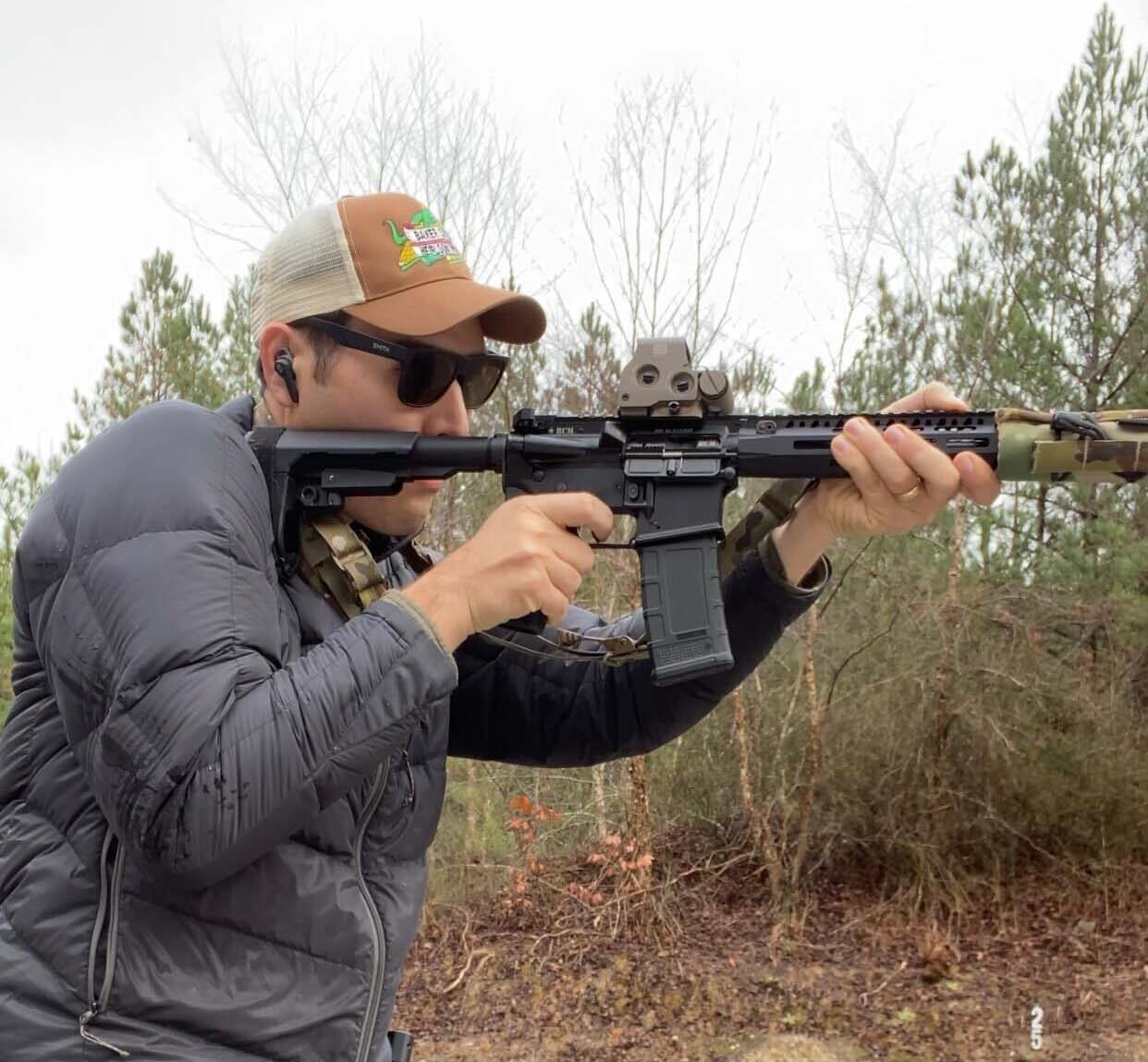
FAQs
Q: How much does a holographic sight cost?
Optics for a defensive carbine usually adhere to the “buy once cry once” rule. I would rather save up for a high-quality holographic sight that I can trust, especially for self-defense. Fortunately, several of the options listed above can be found for less than $500. Premium options like the EOTECH EXPS3 or Vortex UH-1 Gen II will run closer to $600 or more, but I’ve never doubted whether my EXPS3 would perform as expected when I needed it most.
Q: Do holographic sights work at night?
Yes, holographic sights work extremely well in both daylight and nighttime settings, provided you adjust them accordingly. Just be sure that you don’t adjust your setting too high at night or your dot will bloom and make it impossible to see through the optic window.
Q: Can I use a magnifier with a holographic sight?
Holographic sights work well with magnifiers, which is why almost all sight manufacturers offer their own. EOTECH specifically offers their HHS series that includes both the holographic sight and magnifier as a bundle. Another added benefit of the magnifier is that it usually makes holographic reticles appear clearer. Some users complain that holographic reticles can be blurry, which goes away under magnification and provides you with a clear point of aim if your reticle features a 1 MOA center dot.
Final Thoughts
Remember, equipment is only part of the equation, and even the best rifles with the best holographic sights won’t mask poor performance. Proper training is paramount. No matter how hard you try, you cant buy proficiency, so find a reputable trainer and make sure you’re getting the most out of your optics.
Methodology
For this review, I included options that I’ve either used on my personal firearms or had experience with during training. I evaluated these holographic sights based on durability, reticle design, battery life, night vision capabilities, and their compatibility with magnification.

